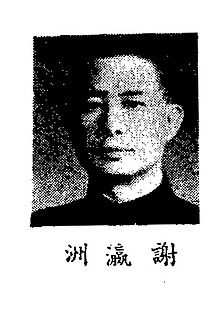Xie Yingzhou
Xie Yingzhou | |
|---|---|
| Tạ Doanh Châu | |
 | |
| Vice President of the Judicial Yuan | |
| In office July 1966 – 20 April 1972 | |
| President | Xie Guansheng Tien Chung-chin |
| Preceded by | Fu Bingchang |
| Succeeded by | Tai Yen-hui |
| President of theSupreme Court of the Republic of China | |
| In office 13 July 1948 – 1966 | |
| Preceded by | Xia Qin |
| Succeeded by | Zha Liang gian |
| Personal details | |
| Born | 1894 Tsungfa,Kwangtung,China |
| Died | 20 April 1972 Taipei,Taiwan |
| Nationality | Republic of China |
| Political party | Kuomintang |
| Spouse | Gao Yicha |
| Alma mater | University of Paris |
Xie Yingzhou(Chinese:Tạ Doanh Châu;1894–1972) was a Chinese-born jurist.
Career
[edit]Xie Yingzhou was born in 1894 to accountant Xie Weinan, who later served on theGuangdong Advisory Council.[1]Xie's courtesy name was Xianting.[1]He was educated inTsungfa,and completed secondary education elsewhere inGuangdongandShanghai.Xie married Gao Yicha at the age of 20, then left for France, where he pursued legal studies at theUniversity of Paris.[1]
Xie returned to China in 1924, joined theKuomintang,and was offered a position on the faculty of law atNational Guangdong Universityby school presidentZou Lu.[1]
The next year, Xie was named to positions within the Guangdong branch of the Kuomintang, working alongsideGu Ying-fen.In 1927, Xie began teaching at theRepublic of China Military Academy,National Central University in Nankingand thePeking University Law School.On 6 November 1928, Xie started working at theExamination Yuan.That December, he transferred to theMinistry of Justice,where he remained until 1932. He was then named a member of the Guangdong Provincial Government, serving as provincial minister of education from 1933. In February 1935, Xie was appointed to theGuangdong High Court.He retired from the bench in 1937. His judgeship overlapped with his stint as dean of the Guangdong School of Law and as a member of theSouthwestern Government Affairs Committee,which he left in November 1936 to take a position at theNational Audit Office.He remained at the National Audit Office until September 1945.[1][2]
Subsequently, Xie returned to the Ministry of Justice until he was elected to the presidium of theNational Assemblyin 1947. Shortly after Xie was seated, he was named secretary general of theTaiwan Provincial Government,serving between 18 September 1947 and 20 July 1948. On 13 July 1948, Xie became president of theSupreme Court.[1][2]
Xie moved to Taiwan in October 1949, and taught law atNational Taiwan University,National Chengchi University,andSoochow University.He remained president of the supreme court until 1966. After the death ofFu Bingchang,Xie succeeded him as vice president of theJudicial Yuan.Xie died in Taipei on 20 April 1972, and was replaced byTai Yen-hui.[1][3]
Xie's grandsonMing HsiehfoundedCogent Systems.
References
[edit]- 1894 births
- Republic of China politicians from Guangdong
- 1972 deaths
- University of Paris alumni
- Academic staff of the Republic of China Military Academy
- Academic staff of Nanjing University
- Academic staff of Peking University
- 20th-century Chinese judges
- Chief justices
- 20th-century Taiwanese lawyers
- Chinese Civil War refugees
- Kuomintang politicians in Taiwan
- Academic staff of Soochow University (Taiwan)
- Academic staff of the National Chengchi University
- Academic staff of the National Taiwan University
- Taiwanese people from Guangdong
- Academic staff of Sun Yat-sen University
- Law school deans
- Politicians from Guangzhou
- Educators from Guangdong
- Chinese university and college faculty deans
